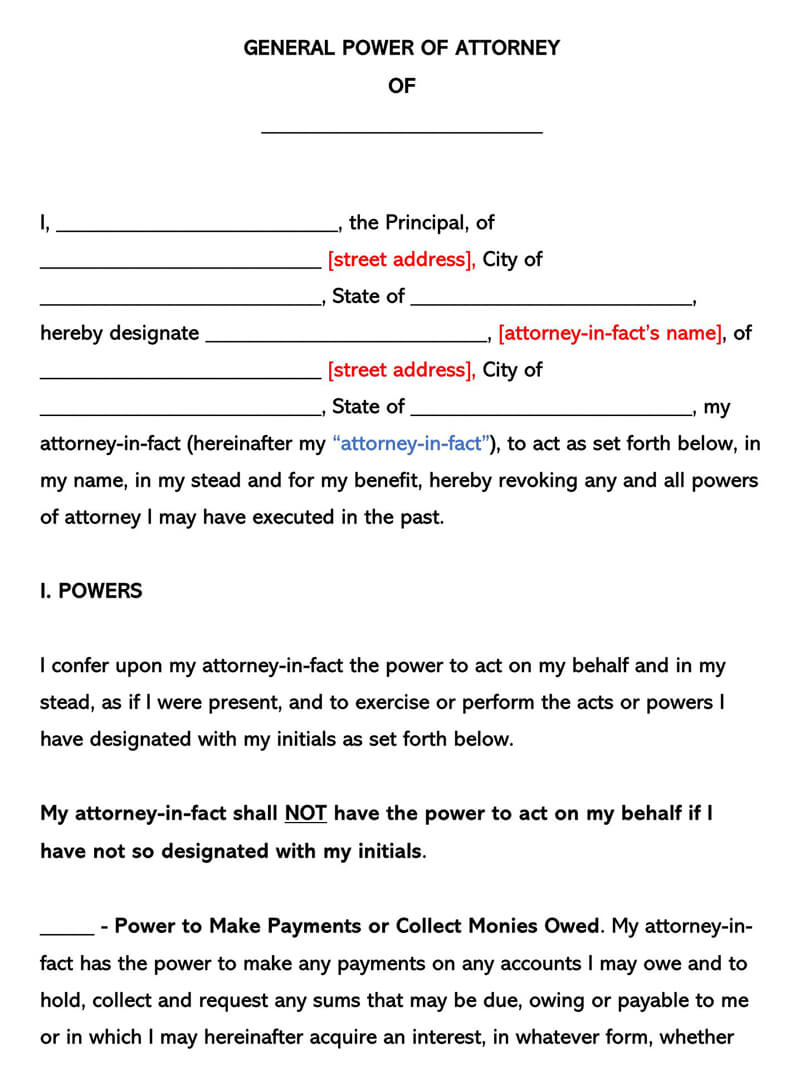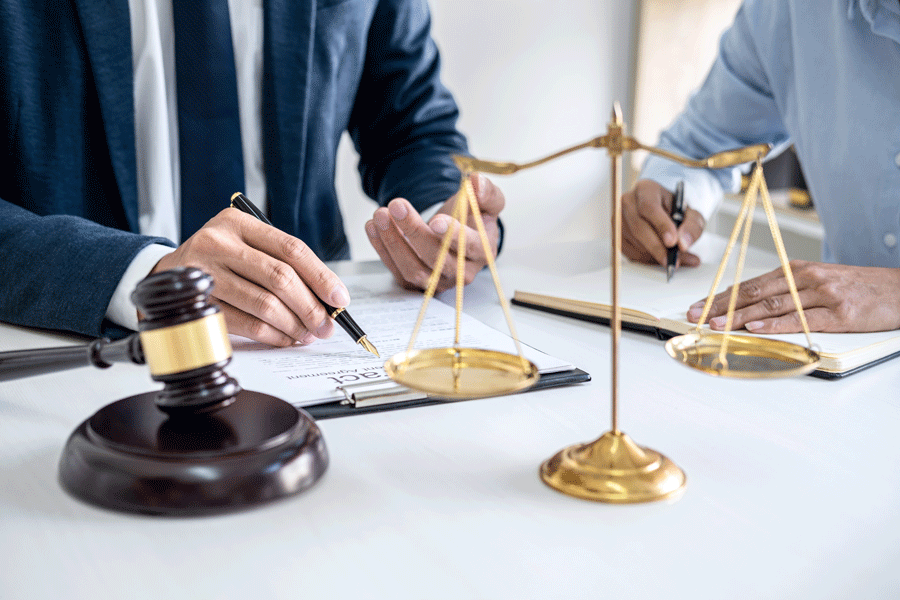A General Power of Attorney (POA) is a non-durable document that allows a person (principal) to transfer the authority to make decisions to another person (agent), also known as attorney-in-fact.
The principal outlines the powers which they would like to authorize the agent to have. The extent of these powers is unlimited and is solely at the discretion of the principal.
As the general power of attorney is non-durable, it becomes invalid upon the principal’s incapacitation – they cannot make decisions or communicate their wishes. Incapacitation can be due to Alzheimer’s Disease, Dementia, or any other sort of cause.
Free Templates
Here are free downloadable templates that can also be customized as needed:
By State
Standard template

Introduction to General POA
A general power of attorney is a legal instrument that is employed by one person to delegate the authority to make crucial decisions to another person. The authority generally stays in force until the issuer (principal) passes on, becomes incapacitated, or revokes it.
Below are some of the duties which the form empowers the recipient to undertake:
- Make and collect payments
- Estate or business management
- Acquire, lease out, or dispose of property
- Issue out gifts
- Deal and handle motor vehicles
- Enter into contracts
- Handle general healthcare issues
- Health Insurance Portability and Accountability
- Sue third parties
- Make safe deposits
General POA vs. durable POA
The primary and only difference between a durable power of attorney and general power of attorney is their durability or duration of validity. A durable POA (power of attorney) allows the agent to continuously make decisions on behalf of the principal even after the principal becomes incapacitated and cannot communicate their wishes. On the other hand, a general POA (power of attorney) becomes invalid/void. When the principal either passes away, becomes incapacitated, the termination date arrives, or after the assigned activities are completed.
Need of general POA
You need this legal instrument in the following three major case scenarios:
- Busy Schedules: If you operate a busy schedule, especially one that entails regular travel, you might not have the time to undertake the roles above on your own. Moreover, you may often be penalized if you do not meet the stipulated headlines. That is why you want to delegate the same to a less busy person.
- Limited Expertise: Some of the chores above require some expertise to undertake. The chances are that you may not have the necessary expertise to do so. To be able to do a good job and meet the requirements of the letter, you will yet again have to choose someone with the right skill to do them for you.
- Legal Compliance: In some states, there are issues that are only performed by persons who are well qualified and appropriately licensed to do the same. In case you are not licensed, the only way forward for you is to choose someone who has those very skills to do that.
Getting a General Power of Attorney
With the busy schedules of today’s society, having a POA can be a necessity for some. So, how does one get a POA? We shall look into the different steps one can adopt when assigning another party to make decisions on their behalf through a general POA.
Determine the powers
Firstly, one should determine the “powers” or responsibilities they wish to transfer to their agent. For a general POA form, the principal should carefully analyze the power descriptions stated. Next to the power they would like to transfer, detailed explanations of the powers should be given. If the power they would like to transfer is not in the list, it should be included as “Other,” and a description of the power should be provided.
Common powers
Despite the variation between one general power of attorney to another, there are common powers found in a form. They include:
- Power to make payments or collect – The principal permits the agent to settle his or her debts and collect that which might be owed to them.
- Management Powers – The principal allows the agent to maintain, improve, manage, invest, insure, lease, repair, etc., any real or personal property (tangible or intangible) they own.
- Power to Purchase, Lease, or Sell Property – The agent is permitted to carry out the mentioned actions with the principal’s personal property as they deem proper.
- Banking Powers – This power is usually limited to making bank deposits, not withdrawals.
- Power to purchase, lease, or sell real property – The agent can execute the said actions to the principal’s real property, provided it is in the principal’s best interest.
- Purchase or sale of motor vehicles – This power permits the agent to represent the principal through a ‘certificate of title upon’ to make transactions regarding the principal’s motor vehicles.
- Gift Making Powers – The principal allows the agent to make gifts, grants, or any other transfers such as charitable pledges or any gifts as directed by a will or lack of it to the principal’s beneficiaries or descendants.
- Tax Powers – This allows the agent to file the principal’s federal income, state income, local taxes, or any other applicable taxes agreed on.
- Lending and Borrowing – Lending and borrowing are usually limited to investment funds.
- Contracts – Normally allows the agent or attorney-in-fact to sign contracts on behalf of the principal.
- Power to Hire and Pay for Services – The principal can authorize the agent to hire or pay for services such as hiring and paying accountants, consultants, attorneys, workers, etc., as seen appropriate or necessary by the agent.
- Health Care – The agent is allowed to make health care decisions on behalf of the principal.
- Reimbursement of Attorney-in-Fact – Allows the agent to be reimbursed for any expenses incurred from personal funds in carrying out the obligations of the POA.
- Power to Sue Third Parties – This power permits the attorney-in-fact to sue third parties meant to transact with the agent but fails to honor the POA resulting in damages or costs.
- Safe Deposit Boxes – The agent is allowed to manage, access, and secure safe deposit boxes.
- Other – This inclusion is made to give the principal the chance to add any other power that was not provided by the form. Principals can therefore customize the form to suit their situation.
Select an agent
Once the powers and responsibilities to be assigned have been identified, the next step is to find a suitable agent. The selection of an agent should be done carefully; the agent should be a trustworthy, articulate, and reliable person. Delegating these powers is a sensitive matter. Due to this fact, the agent can be very influential to the principal’s life – negatively if they fail to carry out the assigned powers purposefully.
Therefore, care must be taken at this stage, and precaution can be attained by having two agents just if the primary attorney-in-fact is not available or able to carry out their general POA-given rights.
Execute
After the principal has determined what powers they would like to transfer and to whom, they can now fill out a general power of attorney form to be executed. The final general POA should be reflective of the principal’s wishes, and as a result, the form requires customization. Once the principal has conveyed their wishes in the form, both parties must sign the document to make it valid and legally binding.
Filling the General POA Form
Filling of a general power of attorney can either be manually or with an editing program. There are crucial details that must be present in an up to standard general POA. To ensure principals include these details in their general POA, we have provided steps that can be used to achieve this:
Title and personal information
The first item to include is the title of a POA. The title of the POA should showcase who the principal is. The principal is expected to provide their full name as it appears on official documents after ‘General Power of Attorney of ….’
After giving a title to the POA, the personal information of the principal and their agent should appear next. The information should include their official name, addresses (street, city, state, and zip code), and state of residence. The principal’s details should appear first, followed by those of the agent in the same format. It is recommended that the address that appears on the attorney-in-fact identification or driving license be used.
Mention the powers
The subsequent step is to indicate the powers the principal intends to transfer to the agent. As the powers are ordinarily outlined in the form, it is up to the principal to provide their initials next to the powers they wish to appoint the agent to be in charge of. The description of each power should be carefully reviewed to ensure that it represents the principal’s intentions. The different types of powers present in the form are the common powers mentioned earlier in the article.
As earlier stated, if the principal wishes to include a power not given in the form, they can state it under “Other” and give a description next to it. If more room is needed to describe the power and/or include other powers precisely, additional paperwork can be attached.
Location and time of effect
The next step is to declare the state under whose jurisdiction the general POA was created and interpreted. Remember that state laws that govern the implementation of a general POA may vary from one state to another. Therefore, defining which specific State the POA falls under ensures that the same state laws are applicable to the principal’s personal and real property outside that state.
The dates when the document is to be effective and terminated should also be provided. They represent the period within which the agent may exercise their assigned authority. There are two options for selecting the effective date, either immediately after signing or at a specified date. The principal should choose their most preferred alternative.
When it comes to termination, there are three options; to terminate the document at a specified date, with a written revocation, or if and when the principal becomes incapacitated. The principal should proceed as they see fit. The date herein should be specific in that detailing the date, month, and year.
Verify the intent
Once the effective and termination dates have been determined, both parties should verify their intention of honoring and executing the general POA as it is. The principal declares that they are aware and has granted the agent the power to carry out the responsibilities stipulated in the document. The principal does this by providing the date when this should be applicable, their name, and their signature.
The agent then declares that they accept the assigned responsibilities and will lawfully execute them by indicating they are indeed the mentioned attorney-in-fact by providing their name and signature. Signing signifies that the parties have read and agreed on the laid-out information.
Since having the signing witness is a requirement, the two witnesses should declare that they were present when the principal signed the document and that he or she did it willingly, is of legal age or over, and of sound mind. This is achieved by providing their names, signatures, and addresses after the witness declaration.
Notarization
Having the document notarized is the final step when filling in a general POA form. The notary public confirms that the signatories are indeed who they say they are. After which, he or she indicates the state and county they represent. The notary public should also provide the date of signing, name, and signature at the bottom of the document accordingly.
Frequently Asked Questions
This requirement varies from state to state. In most states, two witnesses are enough. Others may impose three witnesses, yet others require no witness at all. It is hence necessary that you familiarize yourself with the requirements of your state before proceeding.
You have the leeway to appoint anyone to act as your attorney. These persons must be aged 18 years and above, mentally stable, well-known to you, and trustworthy enough to handle confidential issues on your behalf. Check out your state requirements, too, in order that you do everything in accordance with the law.
You really need no lawyer to draft this agreement. However, a lawyer comes in when reviewing and notarizing the agreement later on. It is also a good thing to hire a lawyer to review the language used and to ensure that every aspect of the document meets the existing legal thresholds.












